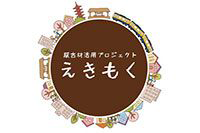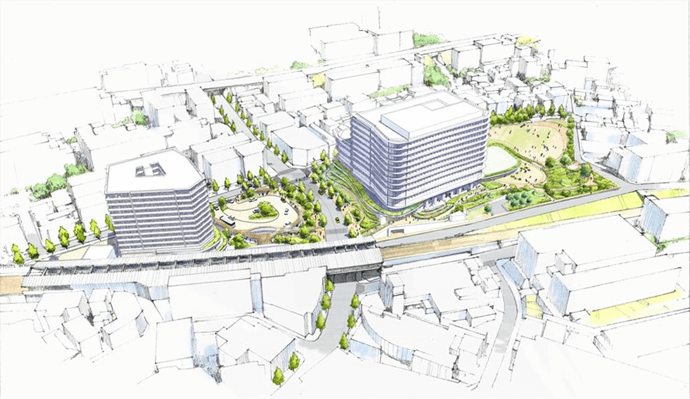Activities of the Council on Measures for People Stranded around Shibuya Station
Cooperation with local crime prevention and disaster prevention activities
Urban and community development in cooperation with the local community in Shibuya
Signing of an agreement on the promotion of new urban development around Fujigaoka Station
The area around Shibuya Station is home to many companies, schools, commercial facilities, and entertainment facilities, and is visited by many people for commuting to work or school, shopping, sightseeing, and more.
The area around Shibuya Station is usually bustling with visitors, but if a disaster such as a major earthquake were to occur and transportation services were to cease, many people would be unable to return home quickly, culminating in major confusion. On weekdays, it is estimated that in addition to the approximately 37,000 people who would remain at work or school, approximately 22,000 people would be stranded outdoors with nowhere to go.
The Shibuya Station Area Stranded Return Home Measures Council was formed in May 2009 by bringing together approximately 100 business establishments, schools, and government agencies around Shibuya Station. As the council's secretariat, Daikin plays a central role in the council, and in cooperation with Shibuya Ward, is promoting activities such as examining ways to increase the effectiveness of measures to help people who are unable to return home, and planning and implementing drills to verify the effectiveness of measures, so that people visiting Shibuya will not be confused in the event of a large-scale disaster.
We will continue to improve disaster prevention measures for the Shibuya Station area, which will continue to change due to development, through ongoing training and other measures, and will continue to cooperate with the Shibuya Station Area Urban Renewal and Safety Assurance Plan, working to Urban and community development can be visited in safety by even more people.

How to ensure safety during an earthquake (Shakeout drill)

Information transmission training using street vision in front of the station

Training on walking to reception facilities using the Shibuya Ward disaster prevention app
We work with local governments, shopping districts, and various other local organizations to hold a variety of events and initiatives in order to revitalize areas served by Tokyu’s railway lines.
Futako Tamagawa Rise holds workshop events on the theme of disaster prevention and emergency preparedness for local children and families. On the day of the event, with the cooperation of the local fire department, hospital, Setagaya ward, and neighborhood associations, the management staff and store staff of Futako Tamagawa Rise themselves act as workshop instructors and participate in awareness-raising activities for disaster prevention and emergency preparedness in the community. In addition, in cooperation with Setagaya ward, we also conduct training every year to accept people who are unable to return home.
In addition, we actively participate in and cooperate with cleaning activities, road safety campaigns, disaster prevention drills, crime prevention patrols, and other activities organized by the local community.



In the Shibuya area, many events are held throughout the year, centered around local residents and the local government. In order to enliven Shibuya together with the local community and the local government, we work with Tokyu Group facilities and other organizations to support these initiatives in various ways.
In addition, we are participating in the Shibuya Area Management Council and Shibuya Station District Area Management (hereinafter referred to as Shibuya Station Area Management), which are public-private partnerships working to make the Shibuya area more attractive. In order to make Shibuya a "hub for disseminating lifestyle and culture open to the world," we are promoting a social experiment to carry out Urban and community development activities with revenue from outdoor advertisements posted in the public space in front of Shibuya Station.
In August 2020, we signed a Comprehensive Collaboration Agreement on the Formation of a Global Hub City with Shibuya Ward. We aim to develop the city into a global hub city as one of the world's leading overseas cities by working on soft urban Urban and community development that utilizes mutual knowledge and personal exchanges, further developing the startup ecosystem through public-private partnerships, promoting cultural dissemination and industrial development, and increasing the international competitiveness of the city of Shibuya.
They are also focusing on disseminating information about the area. The Shibuya Bunka Project website conveys the diverse charms of the Shibuya area through information on events, trends, and gourmet food that are taking place in Shibuya every day, as well as interviews with key people who are active mainly in Shibuya. The aforementioned Shibuya Station Area Management website conveys information on the future vision of the Shibuya Station area, as well as a traffic flow map of the Shibuya Station area under construction in collaboration with the Shibuya Station Center District Construction and Process Council. In addition, the Shibuya Station Area Management official Instagram account conveys not only the latest information on the group's activities, but also the charms of the Shibuya Station area.
Shibuya Station District Area Management official website
Shibuya Station District Area Management official Instagram

The Shibuya Bon Odori Festival

Conclusion of a Comprehensive Collaborative Agreement on the Formation of a Global Hub City

Shibuya Station District Area Management Official Website
Shibuya Cast, a complex that allows creators to realize a more creative lifestyle, was opened in April 2017. It has many shared spaces, such as a plaza, multipurpose space, and cafe, so that people can come into contact with and be inspired by various cultures and values. It also has shared offices and community-style rental housing to promote interaction and serve as a base for people with diverse values.
Since June 2019, Shibuya Otonari Sunday has been held, where people who live and work in Shibuya Ward take the initiative to create a place for casual interaction with their neighbors. Using Shibuya Cast Garden, the event involves interaction with local residents, collaboration projects with companies in Shibuya Ward, and work experience in cooperation with nearby educational institutions. In 2020 and 2021, the event was held online as a measure against COVID-19.



We signed an agreement with Yokohama City to promote "Next-generation suburban development" in April 2012, and renewed it in April 2017 and April 2022. Based on this agreement, we are working on a project to promote sustainable Urban and community development by resolving various issues facing suburban residential areas, including the Tama Den-en-toshi area, (such as aging, population decline, deterioration, and weak community) through collaboration and cooperation between industry, academia, public and private sectors.
Aiming to realize "Community Living *," the company opened "WISE Living Lab" in May 2017 as a place to disseminate information and act as a base for activities related to "Next-generation suburban development." In addition, in October 2018, the company opened "CO-NIWA Tama Plaza," a local convenience facility with multi-generational community interaction functions, familiar employment functions, and childcare support functions on the lower floors of the condominium "Dresser WISE Tama Plaza." The company also established "Dresser WISE Tama Plaza Area Managements General Incorporated Association" and is engaged in area management activities based at this facility.
Furthermore, with the aim of realizing an "autonomous decentralized urban structure," the city is working on initiatives such as supporting efforts to connect people to starting businesses and participating in social activities aimed at solving local issues, creating "workplaces," and collaborating with corporate activities.
In FY2021 we opened "Splus Aobadai," a members-only community exchange center and workplace that utilizes the vacant space of Aobadai Post Office. Based on the results of our activities over the past 10 years since 2012, we will promote the realization of a new, free and prosperous lifestyle under the theme of "Live, work and enjoy in Den-en-toshi."
*A city where all the necessary facilities for daily life are available within walking distance of one's home, allowing everyone to continue living in peace.

WISE Living Lab

Splus Aobadai

In order to reduce CO2 emissions during waste disposal, we are making use of old wood, "ekimoku," secured during the Ikegami Line Ikegami Station improvement work, at the station and along the line. We are holding events such as restoring the platform benches that were installed before the work was completed and holding a workshop to make chairs using "ekimoku," to connect the memories of the historic wooden station, which has been nurtured by the people who have used the station and the local community, to the future through old wood.
In addition, a portion of "Ekimoku" will be sold under the product name "Station Wood" until October 2024, utilizing the know-how of the Furuzaibiyori Group, which collects, processes, and sells domestic old lumber.
In the Shin-Yokohama Line waiting room, materials symbolizing the history of each company, such as Ekimoku, Sagami Railway's bricks, and JR Tokai's recycled Tokaido Shinkansen aluminum, are used for the walls and other interior materials.

The interior of the cafe, which opened in the Oimachi area as a hub for building a community in the area, uses discarded materials such as station furniture and handrails from Tokyu Line trains.

We have installed desks, chairs, and other equipment made using EkiMoku in a shared office that occupies the currently closed "Train and Bus Museum Building B."

Carrying on the memories of the old Ikegami Station, furniture and monuments made from Ekimoku have been installed in various places in the new Ikegami Station building.

In October 2018, we signed an agreement with the City of Yokohama and Showa University for the promotion of urban and community development in order to work toward the realization of a new community where “station-front facilities, hospitals, and parks” are integrated, surrounded by abundant greenery, people-friendly, and where multiple generations can live energetically.
With this agreement in place, Yokohama City, our company, and Showa University are working together to update the functions of aging facilities in front of the station, and Showa University Fujigaoka Hospital, which needs to be redeveloped to make it earthquake-resistant and provide more advanced medical care, as well as to create attractive spaces in the target area, including urban infrastructure facilities such as roads, parks, and station plazas.
FY2020 will be the stage for "making the plan concrete," and as a summary of the status of the discussions under this agreement, the three parties, Yokohama City, our company, and Showa University, announced the "Fujigaoka Station Area Redevelopment Master Plan (Draft)," which is being formulated while listening to the opinions of local residents, in April 2020. From FY2023 onwards, we will continue our discussions with the goal of "implementing concrete projects."

Bird's-eye view from the northeast side *As of the original plan published in April 2021